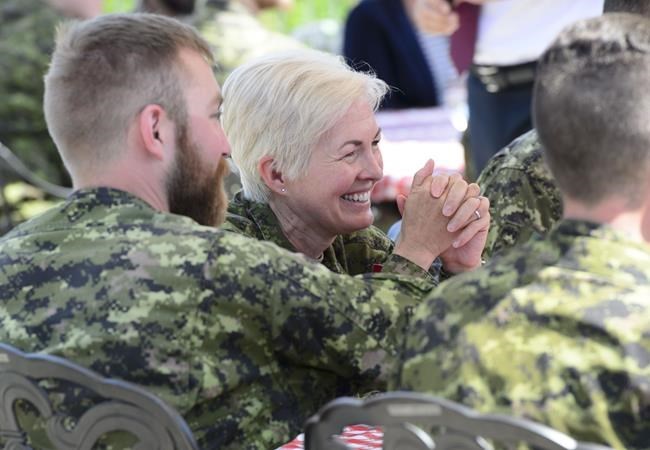OTTAWA — The Canadian Armed Forces is facing fresh calls to create an “explicit exception” for victims of sexual misconduct and their confidantes from having to report incidents to their commanders.
The request is one of dozens of recommendations contained in a new report released Tuesday following nearly two years of consultations involving survivors and military officials.
The government agreed to the consultations as part of its $600-million settlement deal with Armed Forces members and defence officials who experienced inappropriate sexual behaviour in the workplace.
The “duty to report” regulation compels service members to report any type of inappropriate or criminal behaviour — whether sexual or not — to higher authorities, which begins a formal complaint process.
Yet the Survivor Support Consultation Group’s report says the so-called duty to report was a “recurring topic of concern” during its work, echoing past criticisms about forcing victims and their confidantes to report incidents when they are not ready or don’t want to.
“Currently, all CAF members are bound by a regulatory duty to report all misconduct, including sexual misconduct,” reads the report by the group, which included three class-action lawsuit members and three military members.
“Of particular concern is how the duty to report sexual misconduct impacts a survivor’s autonomy over whether, when, and how to report their experiences, and whether and how to seek support following an incident.”
The reference to seeking support addresses what the report describes as long-standing ambiguity around whether the duty to report also applies to Armed Forces medical personnel and clergy.
“Taken together, the ambiguity and inconsistencies in health care and chaplaincy add to the vulnerability of survivors at a critical time,” it says.
The consultation group’s report says it is not the first to raise concerns about the requirement, noting it has also been criticized by survivors’ groups such as It’s Not Just 700 as well as the federal auditor general in 2018.
“Survivors need to be able to choose if, when and where they feel safe to report,” it reads. “In the CAF context in which investigations are not conducted by independent authorities, the ability of victims to choose and to receive support without reporting is essential.”
While the report calls for an exemption “from prosecution for failing to report sexual misconduct,” it allows that such an exemption should not apply to cases in which there is an imminent risk of harm, or where children or national security are involved.
Military commanders have previously resisted removing the duty to report, with military police saying it has helped increase the number of reported cases of sexual misconduct brought to their attention, particularly from bystanders or other third parties.
Yet others have said it discourages reporting and Lt.-Gen. Jennie Carignan, the senior officer responsible for leading culture change in the Armed Forces, indicated last week that an exemption is being considered.
“We are working on the policy coverage for this thing,” Carignan said during an update on her work as the Armed Forces’ first chief of professional conduct and culture.
The stated purpose of the consultation group’s work was to let those affected by military sexual misconduct have a direct influence on the Armed Forces’ policies, programs and services when it comes to responding to such incidents and supporting survivors.
The 45 recommendations include measures to better include survivors in the ongoing development of responses to sexual misconduct, better support different groups such as Indigenous military members, and increase training and accountability in the institution.
In a written response to the report, chief of the defence staff Gen. Wayne Eyre and Defence Department deputy minister Jody Thomas say several of the recommendations are already being acted upon, while the rest will be considered in due time.
Eyre and Thomas do not explicitly mention the duty to report in their response.
This report by The Canadian Press was first published Dec. 21, 2021.
Lee Berthiaume, The Canadian Press



